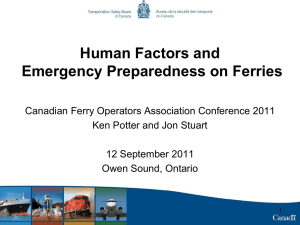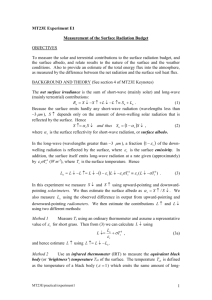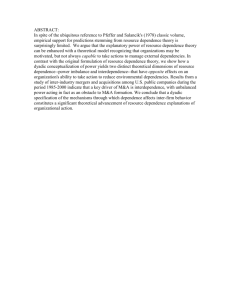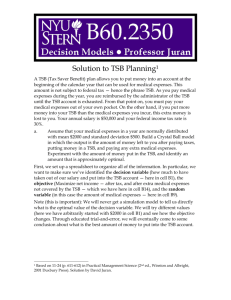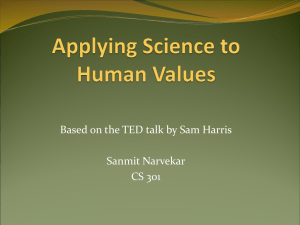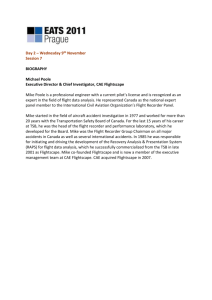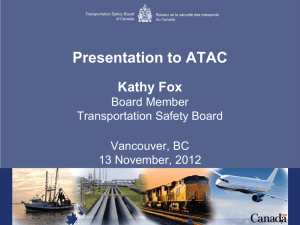Truthmaking and Case-making
advertisement
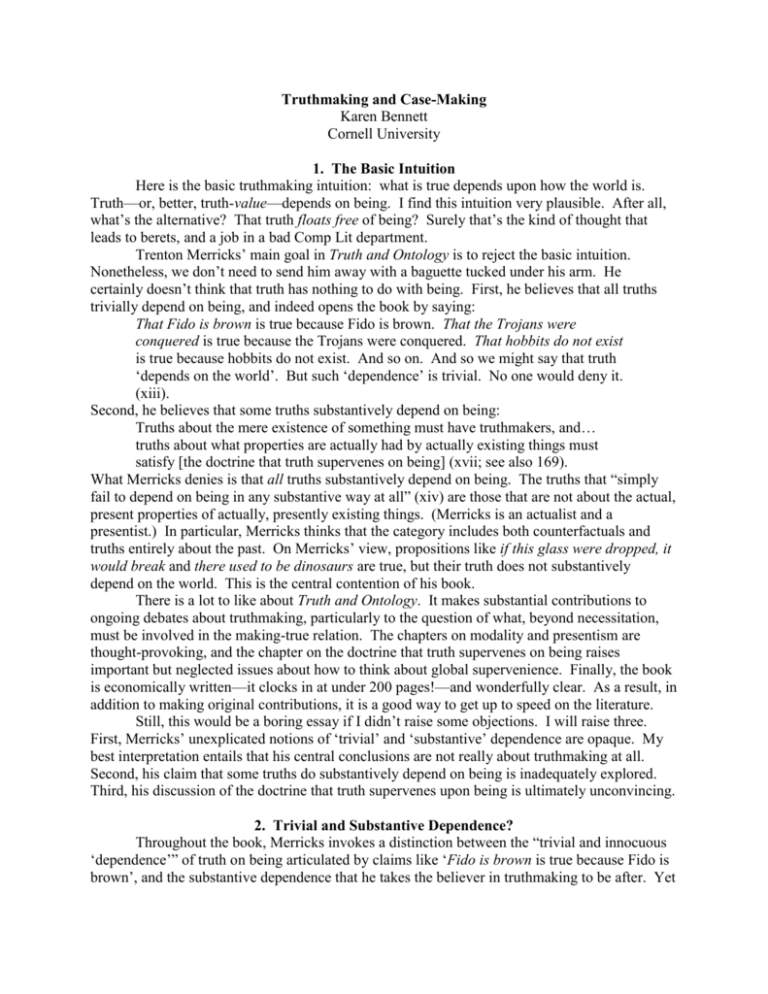
Truthmaking and Case-Making Karen Bennett Cornell University 1. The Basic Intuition Here is the basic truthmaking intuition: what is true depends upon how the world is. Truth—or, better, truth-value—depends on being. I find this intuition very plausible. After all, what’s the alternative? That truth floats free of being? Surely that’s the kind of thought that leads to berets, and a job in a bad Comp Lit department. Trenton Merricks’ main goal in Truth and Ontology is to reject the basic intuition. Nonetheless, we don’t need to send him away with a baguette tucked under his arm. He certainly doesn’t think that truth has nothing to do with being. First, he believes that all truths trivially depend on being, and indeed opens the book by saying: That Fido is brown is true because Fido is brown. That the Trojans were conquered is true because the Trojans were conquered. That hobbits do not exist is true because hobbits do not exist. And so on. And so we might say that truth ‘depends on the world’. But such ‘dependence’ is trivial. No one would deny it. (xiii). Second, he believes that some truths substantively depend on being: Truths about the mere existence of something must have truthmakers, and… truths about what properties are actually had by actually existing things must satisfy [the doctrine that truth supervenes on being] (xvii; see also 169). What Merricks denies is that all truths substantively depend on being. The truths that “simply fail to depend on being in any substantive way at all” (xiv) are those that are not about the actual, present properties of actually, presently existing things. (Merricks is an actualist and a presentist.) In particular, Merricks thinks that the category includes both counterfactuals and truths entirely about the past. On Merricks’ view, propositions like if this glass were dropped, it would break and there used to be dinosaurs are true, but their truth does not substantively depend on the world. This is the central contention of his book. There is a lot to like about Truth and Ontology. It makes substantial contributions to ongoing debates about truthmaking, particularly to the question of what, beyond necessitation, must be involved in the making-true relation. The chapters on modality and presentism are thought-provoking, and the chapter on the doctrine that truth supervenes on being raises important but neglected issues about how to think about global supervenience. Finally, the book is economically written—it clocks in at under 200 pages!—and wonderfully clear. As a result, in addition to making original contributions, it is a good way to get up to speed on the literature. Still, this would be a boring essay if I didn’t raise some objections. I will raise three. First, Merricks’ unexplicated notions of ‘trivial’ and ‘substantive’ dependence are opaque. My best interpretation entails that his central conclusions are not really about truthmaking at all. Second, his claim that some truths do substantively depend on being is inadequately explored. Third, his discussion of the doctrine that truth supervenes upon being is ultimately unconvincing. 2. Trivial and Substantive Dependence? Throughout the book, Merricks invokes a distinction between the “trivial and innocuous ‘dependence’” of truth on being articulated by claims like ‘Fido is brown is true because Fido is brown’, and the substantive dependence that he takes the believer in truthmaking to be after. Yet he never tells us what this distinction comes to. What is it for a dependence relation to be trivial or substantive? In particular, what is it for truth to substantively depend on being? Although Merricks never says, it appears that he requires two features. The first is that there be some being. This becomes clear in his discussion of the claim that truth supervenes on being (§4, 80-85); he thinks it problematic that certain formulations of that claim do not “offer any bit of being” (82) to explain the truth of negative existentials. However, this demand is dialectically odd. Those who prefer a supervenience formulation to Truthmaker—i.e., to the claim that “for each truth there is some entity x that stands in the making true relation to that truth” (14)—do so precisely because it enables them to avoid postulating negative facts or reified absences to serve as truthmakers for negative existentials (see Bigelow 1988, Lewis 2001). Thus if we are to avoid begging questions here, we should not understand the ‘substantive dependence’ of truth on being so that it requires a “bit of being” for each truth. The second requirement is fairer to his opponents. Merricks expects the substantive dependence of truth on being to “catch cheaters” (3; from Sider 2001, 40)—to rule out truth’s dependence on “suspicious properties” (35-38). He says that “those who think that truth depends substantively on being… think that to violate that dependence is to cheat” (74; see also 5, 15), and that “cheaters fail to respect truth’s dependence on being” (82). No such cheater-catching is expected of the trivial dependence of truth on being. Merricks, I think, intends the substantiveness of the dependence of truth on being to consist in its ability to catch cheaters. It is the dependence of truth on honest, upstanding, nonsuspicious being. An immediate consequence is that Merricks’ distinction between trivial and substantive dependence isn’t a distinction between two kinds of dependence relation that can hold between truths and being. It’s a distinction between two kinds of being on which the truths depend. Thus when Merricks says that counterfactuals and truths about the past “simply fail to depend on being in any substantive way at all” (xiv), he is not saying anything about what dependence relation holds between them and the world. Instead, he is saying something about the nature of the dependence base—about what the world is like. So what, exactly, is he saying about what the world is like? He is saying that modality and tense are primitive. Let me explain. If counterfactuals and truths entirely about the past fail to substantively depend on being, they fail to depend on nonsuspicious being. So either they depend on “suspicious” being, or they do not depend on being at all. But Merricks denies the latter; all truths do trivially depend upon being. So he must think that counterfactuals and truths entirely about the past depend upon “suspicious” being. Now, this sounds odd, because it forces Merricks to coopt an epithet lobbed by his opponents. Really, Merricks’ claim is that counterfactuals and truths entirely about the past depend on being that does not itself depend on anything else. I interpret his view in two stages. Stage 1: the truth of a proposition like Lincoln was assassinated depends on Lincoln’s having been assassinated.1 That is the small, trivial way in which truth does depend on being. Stage 2: There is nothing in virtue of which Lincoln was assassinated. Nothing makes it the case; there are no eternalist facts existing outside the present to ground it. It is brute, fundamental, primitive, basic.2 1 Like Merricks, I will not put much weight on the nominalization required by the grammatical difference between ‘Lincoln was assassinated is true because Lincoln was assassinated’ and ‘the truth of Lincoln was assassinated depends on Lincoln’s having been assassinated’. 2 Do not be confused by Merricks’ rejection of Lucretianism. He does not deny that there are Lucretian properties; rather, he denies that they allow presentism to satisfy Truthmaker. “It is a But only that first stage has anything to do with the dependence of truth on being, and it is, by Merricks’ own lights, ‘trivial’. Stage two is instead about the dependence of being on being—of less fundamental on more fundamental pieces of the world. It may be ‘substantive’, but it is not the dependence of truth on being. Yet Merricks would agree that the interesting part is the second stage, not the first. This entails that his central contention has nothing to do with truthmaking at all. It instead has everything to do with what might be called case-making. The question is not “what makes the proposition that Lincoln was assassinated true?”, but rather “what makes it the case that Lincoln was assassinated? What is it in virtue of which Lincoln was assassinated?” This means that Merricks’ claims about tense and modality do not turn on any of his discussion about the nature of truth or the proper formulation of the truthmaking principle. What he needs—continuing to stick to the case of time and tense—are reasons to believe that Lincoln’s having been assassinated cannot be reduced to anything nontensed. That is, what he needs are reasons to think that presentism a) is correct, and b) requires brute facts about the past. He does provide such reasons (125-142), and I will not challenge them here. My claim is simply that they are portrayed as less central to the book than they in fact are. Quite generally, we should take care to distinguish questions about truthmaking from questions about casemaking. The former are about the relationship between truth-bearing representations and the world. The latter are about what facts/properties/entities are plausibly fundamental. Now, Merricks is hardly the only person to conflate the two, and he is responding to a literature in which people do accuse presentism of falling victim to a “truthmaker objection” (e.g. Bigelow 1996, Sider 2001, 35-42, Keller 2004). But both that accusation and Merricks’s response share a false assumption—that it is the job of truthmaking principles to catch cheaters, to settle which properties are ‘suspicious’. It is not. It is not the job of a truthmaking principle to, say, deem irreducible Lucretian properties suspicious (contra Merricks 38). Such properties obviously would satisfy the demand for truthmakers. The only real question is whether there are any. Thus Merricks and his eternalist opponents should take their dispute elsewhere: to questions about which states of the world are plausibly brute. 3. Substantively Dependent Truths Merricks is primarily interested in the negative claim that certain truths do not substantively depend on being. But recall that he also makes a positive claim that certain truths do substantively depend on being: namely, truths ascribing actual properties to actually, presently existing things (xvii, 166-169). In this section, I set aside my questions about what substantive dependence is, and instead ask: what is the relevant class of truths supposed to be? It will be harder than Merricks thinks to demarcate the truths that do substantively depend on being from those that do not. Although he uses the phrase “truths about what properties are actually had by actually existing things” (xvii, also 168), this cannot be what he means. Among the properties that I actually have are dispositional properties, like being such that were I dropped from a sufficient height, I would break. But Merricks explicitly denies that truths ascribing such properties depend substantively on being (chapter 7). So he must mean that truths about what nonmodal, nontemporal properties are actually had by actually existing things cheat to rely” on them (135) for that, precisely because Lucretianism does not provide a substantive answer to the stage 2 question. As will become clear, I prefer to say that Lucretianism does meet Truthmaker, and that this shows that Truthmaker is not where the action is. depend substantively on being. That is better, but now he is left with the famously hard task of weeding out the modal (hypothetical) properties from the nonmodal (categorical) ones. He is also left with the task of denying that the world is fundamentally dispositional, as well as the task of rejecting various dispositional theories about particular domains. In particular, since he frequently uses that Fido is brown as an example of a truth that does substantively depend on being, it turns out that he owes us an argument against dispositional theories of color. 4. The Supervenience of Truth on Being Merricks distinguishes two versions of the thesis that truth supervenes on being (TSB). The first is familiar: Global TSB: “for any proposition p and any worlds w and v, if p is true in w but not in v, then either something exists in one of the worlds but not the other, or else some n-tuple stands in some fundamental relation in one of the worlds but not the other” (71-72; from Lewis 2001, 612). The second is new: Worldwide local TSB: “necessarily, each true claim is such that, necessarily, given all the entities that exist and the properties that each of those entities has, then that claim is true” (72-73). Looming large here is the question of whether any supervenience formulation can genuinely capture the idea that truth depends on being. I will return to this below. For now, I want to focus on Merricks’ main points about these two theses. Merricks claims a) that they are importantly different, b) that global TSB cannot “serve as an alternative to Truthmaker for those who think that truth substantively depends on being” (74), but c) that worldwide local TSB loses the primary advantages of global TSB over Truthmaker—namely, advantages having to do with negative existentials. So, Merricks claims, the doctrine that truth supervenes on being is not much different from Truthmaker. This is too quick. There are two differences between global TSB and worldwide local TSB. One is responsible for the main problems that Merricks raises for global TSB, the other is responsible for the lost advantages. But these differences are a) dissociable from each other, and b) don’t run as deep as Merricks seems to think. Here is one difference. Global TSB requires that actual truths be true in worlds with exactly the same entities and property distribution, but worldwide local TSB requires that actual truths be true in worlds with merely at least the same entities and property distribution (73). This is the difference that makes worldwide local TSB lose global TSB’s nice treatment of negative existentials. As Merricks points out, worldwide local TSB would falsely entail that there aren’t any hobbits is true in a world just like ours except for the addition of a hobbit— unless our world contains a reified hobbit-absence or a “‘nothing more’ property” (73). Worldwide local TSB thus requires an entity (or entities3) to serve as truthmaker for there aren’t any hobbits. For similar reasons, it also requires that the removal of an entity always involves its replacement with a truthmaker for the claim that said entity does not exist. Global TSB requires no such thing, and thus has an advantage over both worldwide local TSB and Truthmaker (70-71 and 93-94).4 3 Merricks argues that worldwide local TSB differs from Truthmaker in that it does not require single entities like states of affairs to serve as truthmakers. 4 Merricks treats these both as lost advantages and as problems for global TSB. That is, in The second difference is that global TSB explicitly invokes possible worlds, and worldwide local does not. In one of the most interesting and original parts of the book, Merricks argues that this gets global TSB into trouble twice over. That’s because Merricks thinks it matters what possible worlds are taken to be. (Pretty much everyone else who invokes global supervenience simply assumes that it doesn’t matter; e.g. Frank Jackson 1998, 10-11.) He offers two arguments here, the first of which is directed against all ersatzists, and the second of which is directed against ersatzists who are also presentists. First, then, ersatzists think that worlds are abstract representations of some sort or other. But that turns global TSB into a claim about what abstract representations represent or entail, and “the idea that truth depends on being is not the idea that every truth is entailed by propositions of a certain sort” (86, italics his). So, says Merricks, ersatzists cannot think that global TSB is sufficient for the dependence of truth on being. Second, Merricks argues that presentist ersatzists also must deny that global TSB is even necessary for the dependence of truth on being. He says that presentist ersatzists should take possible worlds to be possibly true propositions that are maximal with respect to propositions that never change their truth-value (76). Let m be the proposition that Merricks exists. Because m changes its truth-value (alas), it is not entailed by the actual world. So it is not true in the actual world. So it is not true in every world that is just like the actual world. But, says Merricks, it is true. Thus the counterexample to global TSB: m is true and depends on being, but m does not globally supervene on being. I will not comment on either of those arguments here. (Do note, though, that the second argument turns on the surprising claim that presentists must distinguish truth from actual truth.) I simply want to emphasize that they constitute Merricks’ reasons for rejecting global TSB in favor of worldwide local TSB,5 and that they stem from an entirely different source than his reasons for thinking that worldwide local TSB fares poorly with respect to negative existentials. That a version of TSB explicitly mentions worlds has nothing to do with whether it allows actual truths to be true in worlds just like the actual world except for the addition of more entities. Indeed, to avoid the latter issue, all we need to do is fix worldwide local TSB so that it says ‘all and only’ where it currently merely says ‘all’: Worldwide local TSB2: necessarily, each true claim is such that, necessarily, given all and only the entities that exist and the properties that each of those entities has, then that claim is true. That was easy. Worldwide local TSB2 allows there aren’t any hobbits to be false in a world just like ours but for the addition of a hobbit—we do not need to postulate the actual existence of a reified hobbit-absence. Thus this version shares the advantages that global TSB has over Truthmaker. And we haven’t added any explicit reference to worlds. Thus far, then, it looks like worldwide local TSB2 is winning. But of course it isn’t winning, at least not without an awful lot more modal metaphysics. The fact that worldwide local TSB1 and TSB2 don’t explicitly mention worlds doesn’t mean that they escape Merricks’ concerns. They do, after all, contain two occurrences of the modal addition to saying that global TSB has a better treatment of negative existentials than worldwide local TSB, he criticizes it for failing to require a “bit of being” for each truth (his chapter 4, §4; see also my §2 above). I am perplexed by this; indeed, as I suggested above, I think it is question-begging for him to treat it as a liability. 5 Merricks actually offers four arguments, not just two. But one of the other two is the question-begging requirement that even negative existentials be made true by a “bit of being”, and the other is—I think—really a reason against using any kind of supervenience claim. operator ‘necessarily’. If that operator is to be understood as a universal quantifier over worlds, we are back where we started; as far as I can tell, Merricks’ objections above would also apply to worldwide local TSB2 (and TSB1). So perhaps Merricks denies that the modal operators can be understood as quantifiers over worlds. Perhaps, that is, he endorses some form of modalism (e.g. Graeme Forbes 1989). Yet this is a controversial issue that goes unmentioned in Merricks’ book. In sum: it looks like Merricks needs to be a modalist in order for his arguments to tell against global TSB but not worldwide local TSB. Further, it is possible to formulate a modaloperator version of TSB so that it retains global TSB’s advantage over Truthmaker. And, finally, we are still left with the question of whether supervenience really offers the best means of capturing the basic truthmaking intuition. Merricks does address this (87-92), but he is primarily concerned with the fact that necessary truths trivially satisfy both versions of TSB: they supervene on anything whatsoever. But there are other reasons to worry that no version of the claim that truth supervenes on being can itself guarantee that truth depends on being. For example, supervenience is reflexive and non-symmetric, while dependence is plausibly both irreflexive and asymmetric. And if there are any property pairs that form a partition, they supervene (but do not depend) on each other (see McLaughlin and Bennett 2005, §3.5). But bracketing this large, looming issue, the doctrine that truth supervenes on being remains distinct from Truthmaker, with its own set of advantages and disadvantages. Bigelow, John. 1988. The Reality of Numbers: A Physicalist’s Philosophy of Mathematics. Oxford: Clarendon. Forbes, Graeme. 1989. Languages of Possibility. Oxford: Basil Blackwell. Jackson, Frank. 1998. From Metaphysics to Ethics: In Defence of Conceptual Analysis. Oxford: Oxford University Press. Lewis, David. 2001. Truthmaking and difference-making. Nous 35: 602–615. McLaughlin, Brian, and Bennett, Karen. 2005. Supervenience. The Stanford Encyclopedia of Philosophy (Fall 2008 Edition), Edward N. Zalta (ed.), URL = <http://plato.stanford.edu/archives/fall2008/entries/supervenience/>. Sider, Theodore. 2001. Four Dimensionalism. Oxford: Oxford University Press.

